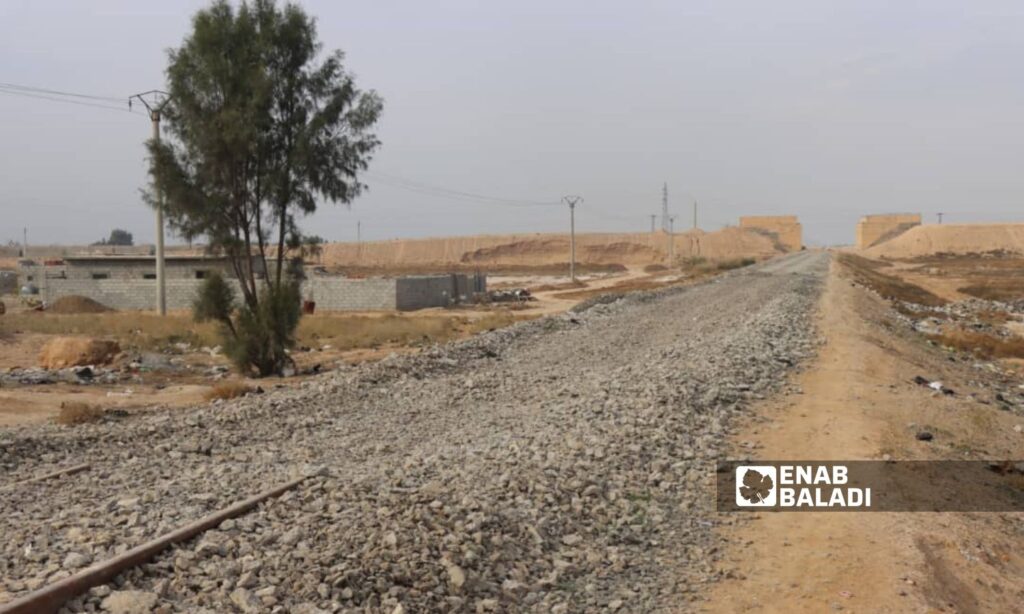Areas under the control of the Syrian Democratic Forces (SDF) in the countryside of Deir Ezzor governorate have been witnessing recurring thefts of oil pipelines and railways for years. The thefts in the area are divided into two types: the first is overseen by dealers who sell the stolen goods for material profit, and the second is carried out by civilians for the purpose of using these pipes or metal parts for agricultural purposes.
In the northern and eastern countryside of Deir Ezzor, oil pipelines are a good resource for farmers looking for useful materials for digging artesian wells for their irrigation projects.
Incidents of metal pipe thefts that were previously connecting the Koniko gas field in the countryside of Deir Ezzor with other provinces were concentrated in the villages Harizeh, Barsham, and Hajinah, through which the pipeline passes north of the province.
According to traders who work in selling these pipes, their price depends on the buyer’s need, and the buyers are asked to transport the pipes to their lands, bearing the risk of crossing the SDF military checkpoints.
The price per meter ranges from 25 to 50 US dollars, while the plastic pipe is sold for six dollars.
Farmers prefer oil pipelines because of their durability; they are made of three layers and withstand weather conditions better than plastic ones, according to a pipe dealer residing in the eastern countryside of Deir Ezzor.
The dealer, who reserved his name for security reasons, told Enab Baladi that he also sells these pipes to smugglers engaged in smuggling fuel towards areas under the control of the Syrian regime via the Euphrates River.
Khader Aldouej, a farmer from the eastern countryside of Deir Ezzor, told Enab Baladi that he bought 450 meters of oil pipelines at a cost of 15,000 dollars to install them in wells for irrigating his agricultural project in the Rweished area north of the province.
Over the past years, some individuals and groups have been stealing oil pipeline installations between the oil fields and those connecting SDF and Syrian regime areas. These operations were not detected early because the oil transport lines through the pipelines had been halted for years.
Railways for metal dealers
The Syrian regime accuses the SDF of stealing railway lines in Deir Ezzor province, while opposition sites accuse the Syrian regime of being involved in these theft operations through local traders and smugglers.
The official Syrian News Agency (SANA) previously stated that supported groups of SDF are stealing the railway tracks in the countryside of Deir Ezzor to smuggle and sell them.
The local site “Deir Ezzor 24” mentioned that the theft of railways takes place within SDF-controlled areas but later transferred to iron smelting factories in the regime-controlled areas west of the Euphrates River and transported between the two regions by smugglers.
A responsible source in the al-Kisrah court east of Deir Ezzor told Enab Baladi that the theft of railway tracks began three years ago but due to the widespread corruption in the area, the regional authorities could not stop the groups responsible for the thefts.
Moreover, the source, who reserved their name as they were not authorized to speak to the media without prior permission, added that both civil and military bodies in the Autonomous Administration of North and East Syria (AANES) are involved in organizing theft operations, which makes pursuing them difficult.
A truck transports a part of the railway line east of Deir Ezzor province – January 23, 2024 (Enab Baladi/Obadah al-Sheikh)
SDF pursues dealers
In December 2023, the SDF surrounded the “16” district in al-Sabha town, east of Deir Ezzor, targeting the home of Yasser al-Hamad, a former leader in the former al-Nusra Front faction (currently known as Hayat Tahrir al-Sham), and one of his brothers who previously held the position of General Manager of the Agricultural Development Company affiliated with the Autonomous Administration (the political umbrella for the SDF).
A military source involved in the security operation previously told Enab Baladi that organized crime elements found metal pipes at the homes of Yasser al-Hamad and his brother, which belonged to the region’s oil fields and had been stolen over the past years. This led them to seal off the area until the houses could be cleared of the pipes.
A second source from the Internal Security Forces (Asayish) participating in the same operation said that the bulldozers could not extract the pipes from their hiding spots due to their abundance, which led the SDF to bring in specialized cranes to lift heavy weights to transport them to the al-Omar oil field.











